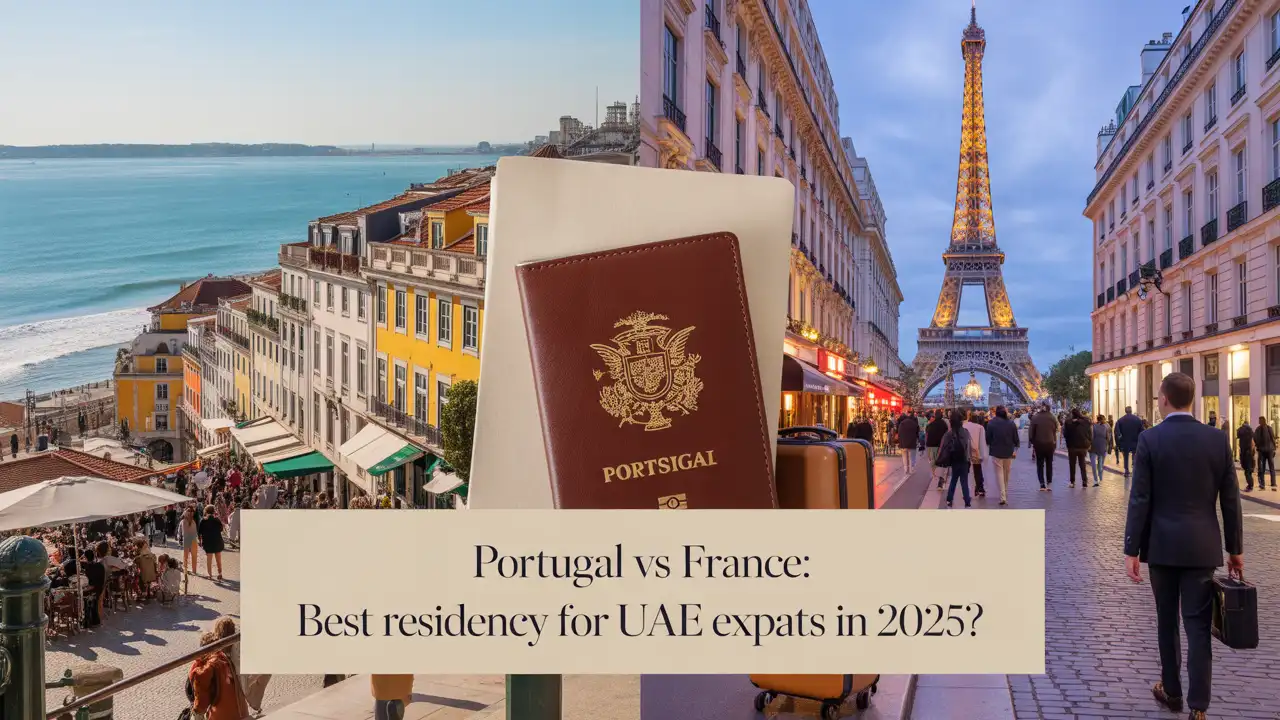Choosing where to live in Europe is a major decision for expats and investors alike. One of the most common comparisons is Portugal vs France, as both countries offer strong residency pathways and a high quality of life. With rich culture, stable economies, and access to the Schengen Zone, each has its own appeal. This guide explores the key factors to help you decide which country suits your lifestyle and goals.
Portugal vs France: Best Residency Option in 2025?
In 2025, Portugal continues to stand out for those seeking an easy, flexible path to European residency, especially if you’re investing, retiring, or working remotely. Its D7 and Golden Visa programs are streamlined and offer attractive tax perks like the NHR regime.
France, while strong for career-focused expats and families, often involves more paperwork, higher taxes, and stricter integration rules. Your best choice depends on whether you value simplicity and lifestyle (Portugal) or structure and public services (France).
Portugal Residency Overview
Portugal offers several attractive residency options that have made it a top destination for international expats and investors. The country’s flexible visa schemes, affordable lifestyle, and friendly climate are key reasons many choose to settle there.
Golden Visa Programme
Portugal’s Golden Visa is ideal for high-net-worth individuals seeking EU residency through investment. You can qualify by investing in property, creating jobs, or funding local businesses. It offers a fast-track to permanent residency and eventually citizenship, with minimal stay requirements.
D7 Visa (Passive Income Route)
The D7 visa is designed for retirees or remote workers with stable passive income—like pensions, rentals, or dividends. It’s popular due to its low cost and pathway to long-term residency. Applicants must show proof of accommodation in Portugal and maintain a minimum income threshold.
Digital Nomad Visa
Launched in 2022, Portugal’s Digital Nomad Visa caters to remote professionals earning from abroad. It allows stays up to one year or converts into a longer-term residence permit. This visa combines flexibility with access to Portugal’s public services and travel rights in the Schengen Area.
Tax Incentives (NHR Regime)
Portugal’s Non-Habitual Resident (NHR) regime offers significant tax breaks for newcomers. Qualified individuals may enjoy reduced or zero tax rates on foreign-sourced income for 10 years. This is especially attractive to UAE residents relocating their tax base.
France Residency Overview
France remains a top choice for those seeking a refined lifestyle, world-class public services, and deep cultural heritage. Its residency options cater to skilled professionals, investors, and long-term residents aiming to integrate into EU life.
Long-Stay Visa Types
France offers a variety of long-stay visas for stays over 90 days, including student visas, visitor visas, and family reunification routes. Most lead to a Carte de Séjour—a residence permit renewable annually and often a first step toward permanent residency.
Talent Passport & Business Visas
The Talent Passport targets highly skilled professionals, entrepreneurs, and researchers. It allows for multi-year residency and includes family reunification benefits, making it suitable for long-term relocation. According to France‑Visas, the Passeport Talent is a strategic permit aimed at boosting France’s economic attractiveness, which makes it especially appealing to qualified expats seeking stable opportunities and growth in France.
Residency Through Employment or Investment
Securing a job with a French employer can lead to residency via employment. Alternatively, significant investment in a French company or property can open doors to legal residence. The system is more structured than Portugal’s, often requiring pre-approvals and stricter documentation.
French Healthcare and Social System
France is renowned for its healthcare system, often ranked among the best globally. Residents gain access to public hospitals, subsidies, and a wide array of services. Social security also extends to education, unemployment benefits, and retirement plans, ensuring long-term stability.
I still remember Sarah, she was genuinely torn between Portugal and France. She’d been living in Dubai for years and wanted a change, but the decision really stressed her out. Portugal’s relaxed vibe appealed to her, but France felt more structured and familiar. We sat down, talked through her lifestyle, budget, even her long-term goals. Eventually, she chose Portugal’s D7 visa, and a few months later, she sent us a photo from her new apartment near Lisbon, smiling by the ocean. She told us it was the first time in years she felt truly at peace.
Now, if you’re in that same place, stuck between options and unsure what fits you best—let’s talk. At The Open World, we’re Dubai-based immigration experts who’ve helped people just like you find their perfect path. Whether it’s Portugal, France, or somewhere else entirely, we’re here to guide you every step of the way. Don’t hesitate to contact us, we’re just a message away.
Visa Application Process: Portugal vs France
When it comes to the visa application process, both Portugal and France offer structured systems—but they differ in speed, paperwork, and long-term flexibility.
Processing Time
Portugal typically has a faster and more flexible process. The D7 and Golden Visa applications usually take 3–6 months, depending on how complete your documentation is. France, on the other hand, may take 4–8 months or longer, especially if applying from abroad or for more complex visa types like the Talent Passport.
Documentation Required
Both countries require proof of income, clean criminal records, and health insurance. Portugal often asks for proof of accommodation, a NIF (tax number), and bank statements. France is more document-heavy—expect contracts, qualifications, employment letters, and sometimes certified translations for all your papers.
Costs & Legal Requirements
Portugal’s Golden Visa requires a minimum €250,000–€500,000 investment, while the D7 visa only demands proof of passive income. Legal fees and setup costs are generally lower than France. France doesn’t have a “golden visa” model, but business and talent visas require demonstrating high-level skills or significant financial input, plus state-approved criteria.
Renewal & Pathway to Citizenship
In both countries, visas are initially valid for 1–2 years and renewable if requirements are met. Portugal allows citizenship after 5 years of legal residency, with relatively straightforward conditions. France also offers a 5-year path, but with stricter integration requirements, including language proficiency and cultural assimilation.
Cost of Living Comparison
When deciding between Portugal and France for residency, cost of living plays a huge role—especially if you’re planning long-term. While both countries offer excellent quality of life, Portugal is generally more affordable, particularly in terms of rent and daily expenses. France, however, offers more structured public services in return for higher taxes.
Here’s a quick comparison based on average costs (monthly, for a single person):
| Expense Category | Portugal (EUR) | France (EUR) |
| Rent (1 BR, city centre) | €800–€1,200 | €1,200–€1,600 |
| Groceries & daily essentials | €200–€300 | €250–€350 |
| Public transport pass | €40–€50 | €50–€80 |
| Healthcare (private top‑up plan) | €40–€80 | €50–€100 ( |
| Income tax + contributions (avg. range) | 14.5%–48% mainland + solid. surcharge | 0–45% + ~17% social charges (~60% total burden) |
Portugal offers better value for money in housing and basic services, while France has higher taxes but more extensive social benefits. Your choice may come down to whether you prefer affordability with flexibility (Portugal) or structure and long-term welfare access (France).
Lifestyle and Language: Which Fits Better?
When it comes to daily living, both Portugal and France offer rich experiences, but in different ways. Portugal is perfect if you’re looking for a calm, sunny lifestyle with an easygoing culture. France leans more toward structure, heritage, and variety, great for those who want depth in art, cuisine, and professional life. Your comfort with language, pace of life, and personal values will play a big role in this decision.
Here’s a breakdown to help you compare:
-
Language & Integration
-
Portugal: English widely spoken, especially in Lisbon, Porto, and Algarve
-
France: French language proficiency is expected, especially for paperwork and work
-
Portugal more welcoming to non-native speakers in daily life
-
-
Climate & Geography
-
Portugal: Mediterranean climate, lots of sun, ideal for beach living
-
France: Varies by region—south is warm, north is cooler, Alps offer snow
-
Portugal better for consistent mild weather, France for seasonal diversity
-
-
Safety & Cultural Life
-
Portugal: Among the safest countries in Europe, relaxed vibe
-
France: More metropolitan energy, rich in museums, fashion, food, and arts
-
Both are diverse, but France offers more high-end cultural access
-
-
Work-Life Balance
-
Portugal: Laid-back lifestyle, ideal for digital nomads or retirees
-
France: Strong labour laws, paid holidays, better protections for employees
-
France more structured, Portugal more flexible
-
Residency Benefits: Portugal vs France
Both Portugal and France offer strong residency perks, but they differ slightly in how those benefits are structured and how quickly they’re accessible. Whether you’re looking for travel flexibility, a future path to citizenship, or family inclusion, each country has its own edge.
Here’s how they compare:
- Travel Freedom (Schengen Access)
-
Both countries are in the Schengen Zone, granting visa-free travel to 25+ European countries.
-
Residency in either country allows free movement across the EU for short stays.
-
- Family Reunification
-
Portugal allows dependents (spouse, children, parents) to join under the same visa process.
-
France also permits family reunification, though documentation and timelines can be stricter.
-
Portugal’s process is often faster and more expat-friendly.
-
- Long-Term Residency & Citizenship Timelines
-
Portugal offers permanent residency after 5 years, with the option to apply for citizenship.
-
France also allows citizenship after 5 years, but language and cultural integration tests are mandatory.
-
Portugal generally has fewer hurdles, especially if you’re investing or on the D7 visa.
-
- Property Ownership Rights
-
-
In Portugal, foreign nationals can fully own property, with no restrictions in most regions.
-
France allows property ownership too, but taxes and inheritance laws can be more complex.
-
Portugal is often favoured by investors for its simpler rules and real estate flexibility.
-
A couple we worked with, Zain and Mariam from Dubai, had two young kids and were torn between Portugal and France. They wanted travel freedom, good schools, and the chance to buy a family home. After comparing the paperwork and timelines, they chose Portugal’s D7 visa. What sealed the deal? The ease of bringing their parents over and the fact they could buy a villa near Cascais without any ownership hassles. Six months in, Zain told us, “We finally feel settled, not just legally, but as a family.
Portugal vs France for UAE Expats
Choosing between Portugal and France can feel overwhelming, especially when you’re planning from Dubai or Abu Dhabi. Let’s break it down in a way that speaks directly to UAE expats.
Community Size & Support
Portugal has a growing Middle Eastern expat community, especially in Lisbon and Algarve. It’s calm and easy to settle into, even for first-timers in Europe.
France, meanwhile, has a long-established Arab and North African diaspora, particularly in Paris, Marseille, and Lyon, great if you’re looking for cultural familiarity.
Accessibility from UAE
Flights to France are more frequent and slightly quicker. You’ll find daily direct flights to Paris from both Dubai and Abu Dhabi.
Portugal is a bit farther, with direct flights to Lisbon averaging around 8–9 hours. Still, both are easily reachable for family visits or quick returns.
Property Investment Appeal
Portugal is a hotspot for UAE investors thanks to affordable property prices and foreigner-friendly ownership laws. The Golden Visa linked to real estate adds extra value.
France has a strong property market, but expect stricter regulations and higher taxes, especially for non-EU buyers.
Local Consulate Support
Portugal’s consulate in Dubai is known for faster appointments and smoother processing, especially for D7 and Golden Visa applicants.
France offers structured visa services, but often involves more paperwork and longer timelines. Legal guidance is detailed but less flexible.
We’ve helped many UAE clients navigate both paths. Some loved the simplicity of Portugal, others felt France matched their lifestyle better. Either way, our job is to make your move smooth and stress-free.
Tired of Overthinking It? Let’s Make It Simple.
We know how stressful it feels—comparing visa options, reading endless requirements, wondering if you’re choosing the right country for your future. Whether it’s Portugal’s flexibility or France’s structure, the questions keep piling up.
That’s where The Open World steps in. As UAE-based immigration experts, we help people like you cut through the confusion, avoid costly mistakes, and move forward with total confidence.
You don’t have to figure it all out alone. Let’s talk about what truly fits your life, and turn your plans into a real, achievable move.
“Book a free consultation, Message us anytime, or Visit us in Dubai. We’re here to help, zero pressure, all clarity.”
Final Thoughts: Which Country Wins in 2025?
There’s no one-size-fits-all answer when comparing Portugal vs France for residency, because it really depends on what you value most.
If you’re after simplicity, affordability, and flexibility, Portugal stands out. It offers lower living costs, easier visa paths like the D7, and a peaceful lifestyle that’s ideal for retirees, digital nomads, or families looking for balance.
France, on the other hand, is better suited for those seeking career opportunities, structured public services, and deeper cultural integration. It shines for professionals, students, and anyone who’s comfortable navigating a more formal immigration system.
Whether you’re drawn to Lisbon’s ocean breeze or Paris’s buzzing energy, both countries offer strong paths to EU residency and citizenship.
Still unsure? Let’s chat. At The Open World, we’ve helped hundreds of UAE expats make the right choice, with zero guesswork. Your journey to Europe starts with a conversation.
Frequently Asked Questions
1. Which is easier to get, Portugal’s D7 visa or France’s Talent Passport?
Portugal’s D7 visa is generally easier and more flexible, especially for retirees or remote workers with passive income. France’s Talent Passport targets high-skilled professionals and usually involves stricter documentation and higher income thresholds.
2. Can I bring my family under both Portugal and France residency programs?
Yes. Both countries allow family reunification. Portugal’s process is simpler and faster, while France provides multi-year permits for spouses and children, with work rights in many cases.
3. Do I need to know the local language to apply?
Not necessarily for the application, but language plays a bigger role in France, especially for integration and eventual citizenship. Portugal is more lenient and many expats live comfortably without fluency in Portuguese.
4. How long before I can apply for citizenship in Portugal or France?
Both countries offer citizenship after five years of legal residence. France requires passing a language test and demonstrating cultural integration, while Portugal has fewer requirements if residency conditions are met.
5. Is it possible to invest in property and get a visa in both countries?
Yes in Portugal, property investment is one of the main Golden Visa options. France, however, doesn’t offer a direct residency route through property alone; you’d need to meet business or employment criteri





